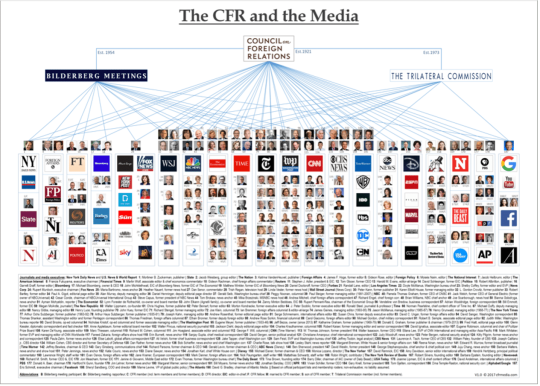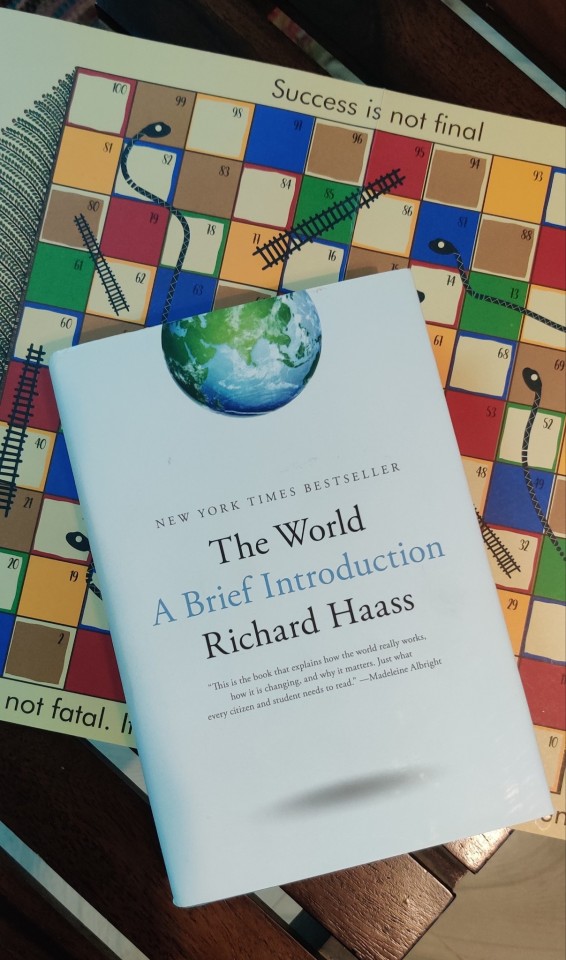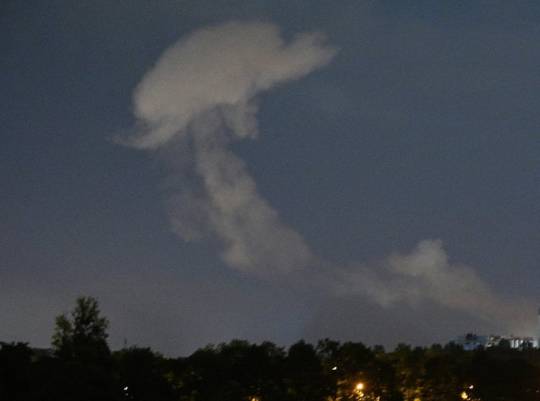#Richard Haass
Text
Still More Snark Keeps Rollin'
Still More Snark Keeps Rollin’
I’m sure you’re surprised to hear that I have still more angst that must be relieved in the form of snarky snippets, right? I mean … what could possibly be causing me stress in these peaceful, calm, dog days of summer? Well, let’s see … let me count the ways … By the way, before I forget, a special thanks to Scottie of Scottie’s Playtime for the header image of the Aunty Acid meme … he sent it…

View On WordPress
#AG Merrick Garland#FBI search for classified docs#media and politicians inciting violence#Richard Haass#threats of violence
0 notes
Text
In the face of the Biden administration’s aggressiveness and belligerence in foreign affairs, one can’t help but wonder: among the U.S. ruling elite, who is advocating war? Is there still a mechanism to curb such belligerence in the country?
This article comes to three conclusions: first, in the Biden administration, two foreign policy elite groups that used to compete against each other, liberal hawks and neoconservatives, have merged strategically, forming the most important foreign policy consensus within the elite echelon since 1948 and bringing the country’s war policy to a new level; second, in consideration of long-term interests, the big bourgeoisie in the United States has reached a consensus that China is a strategic rival, and has established solid support for its foreign policy; and third, due to the design of the U.S. Constitution, the expansion of the far-right forces, and the sheer monetization of elections, the so-called democratic institutions of checks and balances are completely incapable of restraining the belligerent policy from spreading.
[...]
In the field of foreign policy, the most influential think tank since World War II is the Council on Foreign Relations (CFR). This think tank receives donations from a variety of sources, and its current board includes Richard Haass, Bush Sr.’s principal adviser on the Middle East, and Ashton Carter, Obama’s Secretary of Defense. The German magazine Der Spiegel has described the CFR as “the most influential private institution in the United States and the Western world” and “the central politburo for capitalism”. Richard Harwood, senior editor and investigator at the Washington Post, called the council and its members “the closest thing to an American ruling body”.
Regardless of which party’s candidates they support in the elections, this long-standing collaborative network has maintained the stability of foreign policy. This U.S. supremacy worldview that denies other countries’ involvement in international affairs dates to the 1823 Monroe Doctrine, which proclaimed U.S domination to the entire Western hemisphere; only today’s U.S. foreign policy elite has applied this doctrine to the whole world rather than just the American continents. Cross-party synergy and party switching are common for this group of foreign policy makers, and they are closely tied to the ruling capitalist class, as well as to the Deep State (the intelligence services together with the military) that control U.S. foreign policy.
[...]
More critically, the upper echelon of the U.S. bourgeois elite has long been more influential than the “industrial elite” ever was. For example, Michael Bloomberg, whose value is estimated to have reached U.S. $83 billion and who owns 88% of the information services company Bloomberg, has also made considerable stock market investments over the years. Today’s billionaires from Eric Smidt to Charles Koch, George Soros, and Elon Musk, diversify their investments across industries and fund think tanks and policy groups through nonprofit foundations, enabling them to overcome the confines of short-term economic interests and see the big picture of foreign policy, in contrast to those old millionaires who, in the past, were focused on a single industry. A bourgeoisie with a shared consciousness would expect long-term excess returns from a fully liberalized Chinese market following the overthrow of the Chinese state, which is greater motivation for these billionaires to be willing to suffer temporary losses in some sectors as a result of containing China.
The CFR, which is depicted as “leading the U.S. government from behind the scenes,” has Founder-level corporate members including companies in energy (Chevron, ExxonMobil, Hess, Tellurian), finance (Merrill Lynch, Citi, Goldman Sachs, JP Morgan, Morgan Stanley, Blackstone), IT (Accenture, Apple, AT&T, Cisco), Internet (Google, Meta), among other sectors. In a research report published in January, the CFR proposed to “strengthen U.S.-Japan coordination in response to the Taiwan issue”. These policy proposals of preparing for war and containing China reflect the long-term strategic assertions of the bourgeois elite, which include the controllers, shareholders, and key accounts of the CFR members.

236 notes
·
View notes
Text
Everywhere he has gone as president of the Council on Foreign Relations, Richard N. Haass has been asked the same question: What keeps him up at night? He has had no shortage of options over the years — Russia, China, Iran, North Korea, climate change, international terrorism, food insecurity, the global pandemic.
But as he steps down after two decades running America’s most storied private organization focused on international affairs, Mr. Haass has come to a disturbing conclusion. The most serious danger to the security of the world right now? The threat that costs him sleep? The United States itself.
“It’s us,” he said ruefully the other day.
The challenges at home have prompted a man who has spent his entire career as a policymaker and student of world affairs to turn his attention inward. Mr. Haass recently published a book called “The Bill of Obligations: The Ten Habits of Good Citizens,” outlining ways Americans can help heal their own society, like “Be Informed,” “Remain Civil,” “Put Country First” — all admittedly bromides and yet somehow often elusive these days. In addition to consultant work, he wants to spend much of the next chapter of his life promoting the teaching of civics.
“My own trajectory has changed,” he observed during a pair of interviews summing up two decades at the council. “This new book is not something I would have predicted writing five or 10 years ago, but I actually think it’s almost a recasting of American democracy. Now it’s become a national security concern. And that’s different.”
2 notes
·
View notes
Text
The US’s most powerful pro-Israel lobby group has been accused of putting support for Israel before American democracy after it declared its backing for the election campaigns of three dozen Republican members of Congress who tried to block President Biden’s presidential victory.
But the American Israel Public Affairs Committee (Aipac) has defended the move by saying that support for the Jewish state overrides other issues and that it is “no moment for the pro-Israel movement to become selective about its friends”.
In December, Aipac launched a political action committee that enables it for the first time to spend money directly supporting congressional candidates in this year’s midterm elections. Earlier this month the committee released a list of 120 political endorsements that includes 37 Republicans who voted against certifying Biden’s victory after the January 6 storming of the Capitol.
Among them are two members of Congress, Jim Jordan and Scott Perry, who plotted with Trump’s White House to overturn the election result. Perry has also publicly promoted racist “white replacement” conspiracy theories.
The lobby group’s move has been met by a storm of criticism, including from other pro-Israel organizations.
“Aipac’s support for these candidates endangers American democracy and undermines the true interests and values of millions of American Jews and pro-Israel Americans who they often claim to represent,” said the more moderate but less influential pro-Israel lobby group J Street. “Whatever their views on Israel, elected officials who threaten the very future of our country should be completely beyond the pale.”
Richard Haass, the president of the Council on Foreign Relations, described the endorsement of politicians who “undermine democracy” as “morally bankrupt and short-sighted”.
34 notes
·
View notes
Text
VIDEO #1 - A Conversation With Singapore Prime Minister Lee Hsien Loong
Prime Minister Lee Hsien Loong discusses Singapore's perspective on current geopolitical developments, the United States engagement of the Asia-Pacific, and U.S.-China relations.
Speaker - Lee Hsien Loong Prime Minister, Singapore
Presider - Richard Haass - President, Council on Foreign Relations; Author, The World: A Brief Introduction; @RichardHaass
The Council on Foreign Relations (CFR) is an independent, nonpartisan membership organization, think tank, and publisher.
youtube
VIDEO #2 - A Conversation With Foreign Minister Vivian Balakrishnan of Singapore
Speaker - Vivian Balakrishnan Minister for Foreign Affairs, Singapore
Presider - David E. Sanger - White House and National Security Correspondent, New York Times; CFR Member
Foreign Minister Vivian Balakrishnan discusses Singapore-U.S. relations, the future of ASEAN and its geopolitical and economic significance, international trade and economic trends, the role of small states in the rules-based international order, and U.S.-China relations.
The Council on Foreign Relations (CFR) is an independent, nonpartisan membership organization, think tank, and publisher.
youtube
0 notes
Text
0 notes
Video
youtube
Putin's Main Col. (ret.) Lawrence Wilkerson's last positions in government were as Secretary of State Colin Powell's Chief of Staff (2002-05), Associate Director of the State Department's Policy Planning staff under the directorship of Ambassador Richard N. Haass, and member of that staff responsible for East Asia and the Pacific, political-military and legislative affairs (2001-02). Before serving at the State Department, Wilkerson served 31 years in the U.S. Army. During that time, he was a member of the faculty of the U.S. Naval War College (1987 to 1989), Special Assistant to General Powell when he was Chairman of the Joint Chiefs of Staff (1989-93), and Director and Deputy Director of the U.S. Marine Corps War College at Quantico, Virginia (1993-97). Wilkerson retired in 1997 and began work as an advisor to General Powell. He has also taught national security affairs at the George Washington University. Goal? | Netanyahu's Existence Lies in WAR | Col. Larry Wilk...
0 notes
Text
youtube
The Worst US I've Ever Seen | Col. Larry Wilkerson
Col. (ret.) Lawrence Wilkerson's last positions in government were as Secretary of State Colin Powell's Chief of Staff (2002-05), Associate Director of the State Department's Policy Planning staff under the directorship of Ambassador Richard N. Haass, and member of that staff responsible for East Asia and the Pacific, political-military and legislative affairs (2001-02). Before serving at the State Department, Wilkerson served 31 years in the U.S. Army. During that time, he was a member of the faculty of the U.S. Naval War College (1987 to 1989), Special Assistant to General Powell when he was Chairman of the Joint Chiefs of Staff (1989-93), and Director and Deputy Director of the U.S. Marine Corps War College at Quantico, Virginia (1993-97). Wilkerson retired in 1997 and began work as an advisor to General Powell. He has also taught national security affairs at the George Washington University.
1 note
·
View note
Text
Die US-Regierung soll neu definieren, was ein Erfolg der Ukraine ist
Anti-Spiegel: » Wenn Richard Haass in Foreign Affairs einen langen Artikel veröffentlicht, lohnt es sich, ihn genau zu lesen, denn Haass ist seit 2003 der Chef des mächtigen Council on Foreign Relations, von dem die damalige Außenministerin Hillary Clinton seinerzeit erzählte, es würde ihr sagen, was sie als Außenministerin zu tun habe. Wenn Haass etwas veröffentlicht, ist […] http://dlvr.it/SzPRpk «
0 notes
Quote
A diplomatic element will need to be introduced into the equation, including a credible Israeli plan for bringing about a viable Palestinian state.
An Israeli Dilemma | by Richard Haass - Project Syndicate
0 notes
Text
0 notes
Text
"THE BILL OF OBLIGATIONS," BY RICHARD HAASS
Joseph Sciuto
Author 8 books126 followersJuly 26, 2023
Richard Haass’ “The Bill Of Obligations: The Ten Habits Of Good Citizens,” is a book which should be mandatory reading in grammar schools, high schools, Colleges, Graduate schools, trade schools, etc. One should not confuse OBLIGATIONS with Rights. Rights are conferred upon all citizens and non-citizens and one could go to jail for…

View On WordPress
0 notes
Text
Media: Ukraine concerned about Americans' alleged back-channel diplomacy with Russia
Ukraine is worried about alleged secret talks between former U.S. officials and Kremlin-linked Russians concerning Ukraine's NATO membership, NBC News reported on July 8, citing an unnamed Ukrainian official.
“Given the timing of the appearance of these materials in the mass media on the eve of the Vilnius summit, the question arises whether Washington’s tough position regarding the invitation of Ukraine to NATO is somehow not connected with these backroom consultations,” the official said in a statement on behalf of the Ukrainian government.
NBC News reported on July 6 that former U.S. national security officials spoke with Russians, including Foreign Minister Sergey Lavrov, in New York in April to discuss the war, including the fate of Russian-occupied territories, in case Ukraine cannot liberate them with military strength.
The officials included former diplomat Richard Haass, Europe expert Charles Kupchan and Russia expert Thomas Graham, the latter two having formerly served in the White House and the State Department.
NATO members will meet in Vilnius on July 11 to discuss the status of Ukraine's possible membership, as well as the alliance's support for the embattled country.
Ukraine war latest: Pentagon unveils $800 million aid package, approves cluster munition for Ukraine
Key developments on July 7: * Pentagon announces $800 million aid package * US approves cluster munitions for Ukraine * Zelensky arrives in Turkey * Russia excludes IAEA experts from Zaporizhzhia plant’s reactor rooftops * NATO to agree on package ‘to bring Ukraine closer,’ says Stoltenberg *…

The Kyiv IndependentMartin Fornusek

0 notes
Text

The World - A Brief Introduction, Richard Haass (Non-fiction / History, 400 Pages, Hardcover, Penguin Press)
1 note
·
View note
Text

Russians, Ex-US Officials Secretly Discussing Ukraine
Former senior U.S. national security officials have been holding secret talks with key Russians said to be close to the Kremlin, including in one case, Russian Foreign Minister Sergey Lavrov, in hopes of preparing for negotiations that could end the war in Ukraine, according to people briefed on the discussions.
The Lavrov meeting, held in New York in April, involved Richard Haass, a former diplomat and the outgoing president of the Council on Foreign Relations, along with Europe expert Charles Kupchan and Russia expert Thomas Graham, who are former White House and State Department officials and fellows with the Council of Foreign Relations, according to NBC News sources, described as four former and two current officials.
In that meeting, the participants reportedly discussed the fate of Russian-held territory in Ukraine and the search for a diplomatic solution that both sides could approve.
Lavrov was in the United States to chair the U.N. Security Council. At about that time, Haass and Kupchan wrote a lengthy article in Foreign Affairs, a publication by the Council on Foreign Relations about “a plan for getting from the battlefield to the negotiating table.”
They predicted a stalemate after the Ukrainian counteroffensive and recommended the U.S. start with the groundwork to propose a cease-fire leading to a demilitarized zone that would be monitored by either the UN or the Organization for Security and Cooperation in Europe. After that, they wrote, “Peace talks should follow.”
The former officials involved in the meeting either did not respond to requests for comment from NBC News or declined to comment on the record, and the network’s sources declined to be named while confirming confidential talks.
Two sources said the Biden administration is aware of the talks but has not been directing them. The officials who met with Lavrov briefed the White House National Security Council after the talks took place.
In diplomatic talk, such discussions are known as “Track Two diplomacy,” which takes place when there is unofficial engagement involving private citizens, and in Lavrov’s case, the term “Track 1.5” is used, which means current officials are involved in at least one end of the conversation.
It was not made clear how often the discussions have been taking place with the Russians, or if they are being undertaken through an organized effort to bring about diplomatic talks, NBC noted.
Two people briefed on the talks, though, say the discussions have also included some former Pentagon officials, including former U.S. assistant defense secretary Mary Beth Long, who is experienced in issues involving NATO.
The Russians involved in the talks, along with Lavrov, have included think tank or research institute leaders, academics, and others who are believed to be in close touch with Russian President Vladimir Putin and the Kremlin. The Russian participants were not identified by name, out of concern for their safety.
A spokesman for the White House National Security Council declined to comment, and the Russian Embassy in Washington, D.C., did not respond to a request to speak.
Further, an official in the office of Ukrainian President Volodymyr Zelenskyy said there would be no comment on news reports based on unnamed sources, but insisted that Ukraine’s “position is unchanged.”
“The fate of Ukraine cannot be decided without Ukraine,” the official said. “Many times the president and all our official speakers spoke about it. Not anonymously, but quite specifically and publicly.”
There are signs that the U.S. and its allies want the two countries to move toward having peace talks this fall.
In May, CIA Director William Burns heard from Ukrainian officials during a secret trip to Kyiv about pushing Moscow toward peace talks before the end of the year, according to reporting from The Washington Post.
There are questions about whether the secret talks will continue after the revolt waged by Wagner mercenary chief Yevgeny Prigozhin. The discussions are also taking place while other conversations are being held between the United States and Russia concerning detained U.S. journalist Evan Gershkovich, which Putin’s spokesman revealed this week.
#Russians#Ex-US Officials#Ukraine#Russia#Kremlin#Russian Foreign Minister Sergey Lavrov#NBC News#Ukrainian
0 notes
Text
Richard Haass: The Ten Habits of Good Citizens
View On WordPress
0 notes